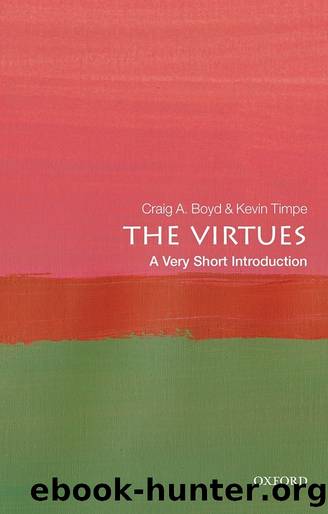The Virtues by Craig A. Boyd & Kevin Timpe

Author:Craig A. Boyd & Kevin Timpe [Boyd, Craig A. & Timpe, Kevin]
Language: eng
Format: epub
ISBN: 9780192584076
Publisher: OUP Oxford
Published: 2021-01-21T00:00:00+00:00
Table 2 CNBC poll: Affordable Care Act
very positive 10%
somewhat positive 12%
neutral 11%
somewhat negative 13%
very negative 24%
donât know/not sure 30%
Unsurprisingly, the change in terminology affected peopleâs political affiliation. When the data were broken down by political party, the poll found that Republicans viewed the bill more negatively when it was referred to as Obamacare, with Democrats viewing it more positively when referred to this way.
These results suggest that peopleâs opinions on the bill were shaped not just by the contents of the bill, but how they saw the bill relating to their own political party. Not exactly the model of intellectual excellence.
We ought, therefore, to evaluate ideas in their best possible light, doing our best to accurately understand them before evaluating them, lest our biases colour how we evaluate them. If thereâs uncertainty about exactly what those ideas are, we ought to interpret them charitably. (Given that this virtue involves treating those with whom we disagree fairly, we could also refer to it as intellectual fairness.) Nicholas Wolterstorff puts the principle of charity this way: âThou must not take cheap shots. Thou must not sit in judgement until thou hast done thy best to understand. Thou must earn the right to disagree.â But intellectual charity involves how we evaluate our own positions as well. Wolterstorff continues: âGenuine engagement entails both an effort to internalize the arguments of opposing viewpoints, understanding them from the inside, and an effort to examine oneâs own position from the outside, testing it for weaknesses.â
If our goal is truth, we ought to approach even the arguments of our so-called âopponentsâ in a cooperative spirit, seeking to discover what we can learn from them, rather than being guided by a combative spirit. Debate should be done cooperatively rather than competitively.
This discussion of intellectual virtue hasnât sought to be exhaustive. There are a range of other epistemic excellences that we havenât addressed. There is, for example, the excellence of knowing those topics of inquiry that are most deserving of our inquiry. We havenât discussed intellectual vigilance or generosity. We havenât focused on those intellectual virtues that are inherently social in nature, such as trust or eubulia (the virtue of knowing from whom we should take counsel). The whole range of intellectual virtues are excellences that make us better thinkers and believers.
We can think of epistemic vices as those dispositions to feel, to think, and to behave in ways that are epistemically harmful. The vice of epistemic complacency is just one example. Epistemic vices can harm us not just individually but also corporately; that is, they can harm us politically. Quassim Cassam uses the 2003 US-led invasion of Iraq, and the search for alleged weapons of mass destruction, to illustrate the vice of closed-mindedness. Senior military figures, including army chief of staff General Eric Shinseki, told the Bush administration that at least 300,000 troops would be needed to pacify Iraq. President Bush, on the advice of Defense Secretary Rumsfeld, thought that 40,000 troops would be sufficient. (About 130,000 US troops ended up being sent.
Download
This site does not store any files on its server. We only index and link to content provided by other sites. Please contact the content providers to delete copyright contents if any and email us, we'll remove relevant links or contents immediately.
Professional Troublemaker by Luvvie Ajayi Jones(28965)
Whiskey Words & a Shovel I by r.h. Sin(18834)
Rewire Your Anxious Brain by Catherine M. Pittman(17589)
Healthy Aging For Dummies by Brent Agin & Sharon Perkins RN(16610)
Cat's cradle by Kurt Vonnegut(13868)
Talking to Strangers by Malcolm Gladwell(11879)
The Art of Thinking Clearly by Rolf Dobelli(8842)
They Both Die at the End by Adam Silvera(8611)
Doing It: Let's Talk About Sex... by Hannah Witton(8550)
The 5 Love Languages: The Secret to Love That Lasts by Gary Chapman(8497)
Thirteen Reasons Why by Jay Asher(7788)
Wonder by R.J. Palacio(7732)
Goodbye, Things by Fumio Sasaki(7728)
The Compound Effect by Darren Hardy(7560)
Atomic Habits: Tiny Changes, Remarkable Results by James Clear(7219)
Becoming Supernatural by Dr. Joe Dispenza(7106)
Wonder by R. J. Palacio(7060)
Tools of Titans by Timothy Ferriss(6948)
Should I Stay or Should I Go? by Ramani Durvasula(6785)
